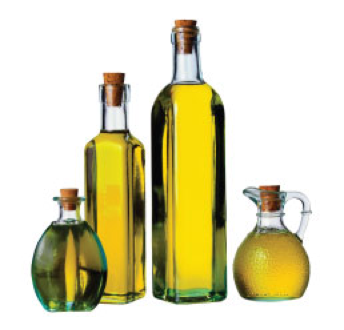There are so many different types of cooking oils that it can be quite confusing as to which oils should be used and when. Oils perform well at different temperatures and it’s an important thing to know so you don’t unknowingly destroy the good properties whilst cooking.
A good example is Flaxseed Oil. It is an omega 3 fat that shouldn’t be heated as it can actually become rancid and be harmful to your health. Flaxseed oil (also known as Linseed Oil) is best taken straight off a spoon, used in salads or added to foods after the cooking process.
Olive oil is a monounsaturated fat which is a great antioxidant and also great for your heart, it is safe to cook with as long as it is cooked on low heat.
Canola oil is a Genetically Modified product made with rape seed oil (although you can seek out organic and GMO free Canola oil). It is used in candles, lipsticks, soaps, inks, lubricants, and biofuels. It is actually an industrial oil, not a food. I do not recommend using GMO foods in the diet at all as there is not enough research as to how it affects us long term.
When oil’s reaches smoking point, they release free radicals and carcinogens (cancer-causing compounds) into the oil and air. If an oil that you are cooking with reaches this point, throw it out and start over with a clean pan and new oil, and cook at a lower temperature.
This is a handy list of Types of Oils and their heat thresholds.
Extremely high-heat oils, which have a high smoke point, can be used in temperatures up to 260 degrees. These include avocado oil, almond oil, rice bran oil, palm oil, and sesame oil.
Medium high-heat oils, which have a medium to high smoke point, can be used in temperatures up to 220 degrees. These include grapeseed oil, coconut oil, cacao oil and ghee butter.
Medium heat oils, which can withstand some heat but are best for light sautéing and sauces, can be used in temperatures up to 180 degrees. These include sesame oil, peanut oil, olive oil, and corn oil.
No-heat oils, which should never be used for cooking and are best used on foods that are already cooked, can withstand temperatures up to 100 degrees. These include flax oil, borage oil, evening primrose oil, and wheat germ oil.
Coconut oil is quite popular and I personally use it all the time. It is a saturated fat and this being the case it can actually raise your LDL (Low Density Lipoprotien) which is your bad cholesterol. Therefore anyone with high LDL cholesterol should only use it minimally or better still stick to using rice bran or olive oil as they can lower your bad cholesterol.
Some other things to look for when buying cooking oils include:
- Pressed from organically grown seeds and nuts.
- Protected from light, air (oxygen), and heat during pressing, filtering, and filling.
- Sold in dark glass bottles that say ‘unrefined’ on the label.
- Oils that are ‘expeller pressed’ by manufacturers that make an effort to keep the pressing temperature low.
I hope that you all have a clearer understanding of oils – but remember to use them sparingly if you’re on a weight loss program. 1 tablespoon is about as much as you need per day if you are consuming other healthy fats such as almonds, avocado, lean proteins or oily fish.
Written by Elisha Danine – Nutritionist
GET YOUR 10% DISCOUNT
If you are ready to lose weight then the Lose Baby Weight plans offer a healthy and safe exercise and diet routine and you can get a 10% discount by using code LOYALTY at the checkout
PLUS our BEST SELLING 28 Day Diet & Exercise Plan has now launched as an 84pg Printed Book and you can get your copy here
Click HERE to see our shop

